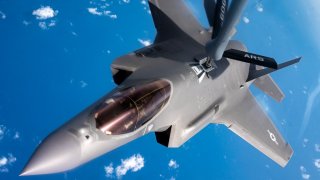Report: High Inflation Is Disrupting U.S. Military Power
A new report from the National Defense Industrial Association details how the department could address the $42 billion gap it will have in the next fiscal year.
Inflation is a persistent problem and in addition to making groceries and gas more expensive, it has also been affecting the Pentagon. A new report from the National Defense Industrial Association, “How Inflation Hurts America’s National Defense And What We Can Do About It,” lays out how inflation has continued to affect the defense industry.
“The Department of Defense (DoD) is dealing with significant inflation for the first time in 40 years. As detailed in this report, the DoD is particularly vulnerable to sudden inflation because of its lengthy budget and acquisition process,” the report said. This has diminished the department’s purchasing power.
“The first step is to understand both the breadth and seriousness of the challenge. This paper offers Congress and the American people an explanation of the problem and a detailed estimate of inflation impacts,” the report says. “The second step requires taking action. We provide recommendations to mitigate the damage where possible in the relevant sections of this paper.”
The authors are former Secretary of the Army Dr. John E. Whitley, National Defense Industrial Association (NDIA) CEO David L. Norquist, and NDIA inflation task force head Lisa S. Disbrow.
As Reuters noted, the Pentagon will need an extra $42 billion in the next fiscal year in order to deal with inflation.
Other recommendations include Congress adjusting its next continuing resolution for inflation, stabilizing acquisition programs, and enhancing data reporting.
“All Americans are feeling the impact of the current high rate of inflation. Inflation is particularly disruptive to our national defense because the long budget and acquisition processes DoD uses prevents timely adjustments for inflation. Absent relief, it will undermine the readiness of our forces, the quality of life for our service members, and the timely deployment of modern weapon systems to our warfighters. The primary impact of inflation is loss of buying power, which can be divided into two key challenges: Future Budget Challenges and the Current Execution Crisis.”
The report is written with the assumption that inflation has already peaked, will “decline to normal levels during the end of Fiscal Year (FY) 2024,” and that Congress will “fund future budgets for FY 2024 and beyond to a topline that finishes correcting for actual FY 2021, FY 2022, and FY 2023 inflation.”
“This significant financial cut to the DIB arrives on the heels of the COVID-19 pandemic and supply chain challenges, adding significant risk to defense modernization as a hedge against potential near-peer conflict. Because it is easier and faster to adjust prices in the private sector, if the impact of inflation on contracts is not addressed, firms that have a choice may exit the defense industrial base for the commercial markets and reducing competition and diversity in the DIB,” the report concluded.
Stephen Silver, a technology writer for The National Interest, is a journalist, essayist and film critic, who is also a contributor to The Philadelphia Inquirer, Philly Voice, Philadelphia Weekly, the Jewish Telegraphic Agency, Living Life Fearless, Backstage magazine, Broad Street Review and Splice Today. The co-founder of the Philadelphia Film Critics Circle, Stephen lives in suburban Philadelphia with his wife and two sons. Follow him on Twitter at @StephenSilver.
Image: DVIDS.

